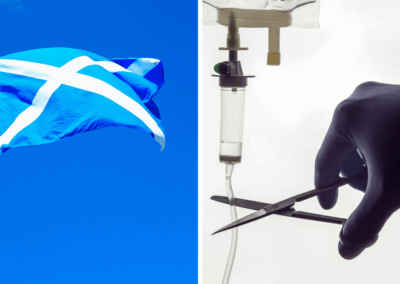Results of a Scottish Parliament consultation on Gillian Mackay MSP’s buffer zone Bill show that 77% of respondents to the consultation are opposed to introducing buffer zones in Scotland.
Released earlier today, the results of the public consultation on the Abortion Services (Safe Access Zones) (Scotland) Bill reveal strong opposition to plans to introduce buffer zones around abortion clinics in Scotland. The Bill was introduced in October 2023 and is currently progressing through the Scottish Parliament.
Out of the 5,856 responses to the question ‘Do you agree with the overall purpose of this Bill?’, 4,517 (77.13%) disagreed, 1,288 (21.99%) agreed, 40 (0.68%) partially agreed and 11 (0.19%) responded ‘don’t know’. (Full calculations and sources for these figures are available here).
Summaries of the responses to the proposed legislation were also released that present some of the specific reasons why respondents were so opposed to the Bill. Some respondents said buffer zones would prevent some women from being offered the help they need.
One person said: “I worry that these buffer zones will prevent women who are unsure of their decision on abortion to explore options many peaceful volunteers seek to educate women on. This is so they can make a more informed decision about their pregnancy. This is important to me personally as two of my friends felt forced into abortion by their baby’s father and later suffered mentally as a result. If they had had a volunteer to educate them more on the options available, I believe they may have chosen differently and not have to live forever with the regret of their abortions”.
Another respondent who had accessed an abortion and expressed her opposition to the Bill said: “I wish someone had been there to offer me help and advice before I had an abortion. It was the biggest mistake of my life”.
Other respondents pointed to the fact that the Bill creates unnecessary legislation because “… there are laws against harassment and, used properly, these are sufficient to protect everyone in a fair way”.
Some respondents noted that Police Scotland had not called for new powers in order to be able to deal with vigils offering help to women outside abortion clinics. The consultation response summary notes that this “was confirmed by Police Scotland’s submission, which stated that they considered existing legal powers to be sufficient”.
Many individuals described the legislation as “draconian” with one individual saying “Are we seriously going to criminalise and convict grannies praying?”.
The most extreme abortion buffer zone legislation in the world
Polling from Savanta ComRes shows that only 30% of the population in Scotland support the introduction of nationwide buffer zones around abortion clinics.
The poll assessed support for buffer zones of 150 metres, as will be introduced in England and Wales, so it is likely that support would be even lower for the Mackay buffer zone Bill given the proposed law in Scotland would introduce a more extreme 200m buffer zone.
Despite overwhelming opposition to the Bill from respondents to the consultation, and polling that shows that only a small percentage of the population in Scotland supports the introduction of nationwide buffer zones, the Health, Social Care, and Sport Committee has agreed to the overall principles of the Bill, and has recommended the Scottish Parliament do the same.
If the Bill becomes law, it will introduce the world’s most extreme buffer zone law in Scotland.
The Bill proposes an extreme law change in Scotland that would create a minimum of 200m ‘safe access’, or buffer, zones around any facility that performs abortions where offering support to women would be criminalised. The 200m is a minimum, as abortion providers can apply for the zone to be extended, with the Bill giving the Scottish Government the power to extend any buffer zone beyond the 200m if they judge that the existing zone “does not adequately protect” women seeking an abortion. There is no limit on the size of the buffer zone that can be created under this power.
The minimum size of the buffer zones introduced by this law extends further than the minimum size of any other buffer zones in the world. For example, the Public Order Act 2023 in England and Wales sets the limits of the buffer zones at 150m and the legislation does not give the Government the power to extend buffer zones beyond 150m. Most buffer zones in Northern Ireland are 100m, half the size of what is being proposed in Scotland.
Within these zones, it will be illegal to influence a person in regard to their decision “to access… the provision of abortion” in an abortion clinic or a hospital. These provisions would make offers of help to women seeking an abortion illegal within a buffer zone, and could criminalise silent prayer.
Anyone who commits an offence can be fined up to £10,000 on a summary conviction, or an unlimited fine on indictment.
The provisions of the Bill apply to anything that is “visible or audible” within a buffer zone, even if these relate to private buildings. This means it may be illegal for pro-life signs to be displayed from a window within a private home or outside a place of worship if the signs are within the boundaries of or visible to a buffer zone. Similarly, conversations in private homes or outside churches may be included if they are audible inside a buffer zone. Referring to private dwellings, Mackay herself told the Committee “it is essential that such premises are covered by the legislation”.
Spokesperson for Right To Life UK, Catherine Robinson, said “The results of this consultation show that the vast majority of the respondents oppose the introduction of buffer zones in Scotland”.
“Polling from Savanta ComRes shows that only 30% of the population in Scotland support the introduction of nationwide buffer zones around abortion clinics”.
“Despite overwhelming opposition to the Bill from respondents to the consultation, and polling that shows that only a small percentage of the population in Scotland support the introduction of nationwide buffer zones, the Health, Social Care, and Sport Committee has unanimously agreed to the overall principles of the Bill”.
“This Committee has totally ignored the overwhelming opposition to this Bill and instead is supporting the introduction of the world’s most extreme buffer zone law in Scotland”.
“This legislation goes further than any buffer zone legislation in other jurisdictions, creating a larger buffer zone than anywhere else in the world and giving the Scottish Government powers to extend these zones without limit”.
“Many women have been helped outside abortion clinics by pro-life volunteers who have provided them with practical support, which made it clear to them that they had another option other than going through with the abortion”.
“The proposed law change would mean that the vital practical support provided by volunteers outside abortion clinics will be removed for women and many more lives would likely be lost to abortion”.
“This is a truly draconian piece of legislation that reaches into the homes of ordinary people. It creates an offence for being publicly pro-life. It is direct viewpoint discrimination”.
“No one else is penalised for hanging the flag of their favourite football team from their window, or having a ‘Vote Labour’ sign, but if an individual or a church wants to display a sign, from within their own property, which says ‘Pregnant? We can help’, they may be guilty of violating this buffer zone legislation”.
“This legislation is not only a direct attack on free expression and public association based on viewpoint, it is entirely unnecessary insofar as harassment and intimidation are already illegal. Wherever they occur, existing legislation can and should be used to put a stop to them”.












